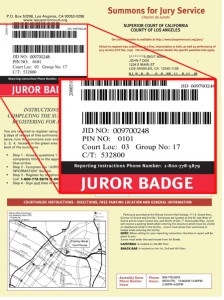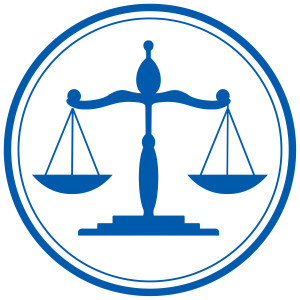This week we are featuring a blog post from our "sister" blog, the Learn + Teach + Share. This was originally posted there on May 29, 2013.
Only in L.A. When I went for jury duty a few weeks ago, the one trial whose jury was being filled was a 90-day trial. I suspect that the 90 days was largely due to high profile clients and deep pockets for legal expenses. Regardless, 90 days was what was expected and in talking about it, the judge gave me more to think about than she realized.
 I've served jury duty many times: twice being selected for a jury (one criminal, one civil) and many times being part of a panel but not selected. So I am used to the normal jury instructions...
I've served jury duty many times: twice being selected for a jury (one criminal, one civil) and many times being part of a panel but not selected. So I am used to the normal jury instructions...
- You cannot talk about the trial for the duration of your time as a juror.
- If somebody starts to talk to you about the case, you need to let them know you are a juror and cannot talk about it and then walk away.
- You cannot go and search for evidence for the case yourself, but must rely on what is provided in the courtroom.
Twenty years ago, that final bullet included a comment to not go out to the scene of the crime. This time, it was more focused on seeking evidence or information on-line. 90 days of not looking on-line for any information about or pertaining to the case, whether on purpose or because it stumbled across your path through the online world of blogs, twitter, facebook updates/likes, and other social media.
Pause and think about what that really means in practice. 90 days of not looking online, not reading, thinking about or exploring anything that comes to you in your email inbox, Facebook wall, twitter feed, or so on, about a case which is sure to be high profile. (I've heard it reference on the radio twice since jury duty.) 90 days.
That would be significant enough, but it was followed by the line that really caught my attention,
"I know this may be different from how some of you learn."
In this sentence, the judge recognized that she was asking of potential jurors something more than just cutting themselves off from news. That much has been a constant need for juries hearing and deliberating about a case behind the closed doors of the courtroom. The internet and our habits of gaining news from social media as well as or in lieu of news broadcasts may have made that element itself more challenging, with information being pushed to us rather than us having to go out and pick up the paper to search for information. However, that was not all that this judge identified as a new challenge. "This may be different from how some of you learn."
What IS changing in the way people learn? And how is that impacting our justice system?
While educational researchers are studying the impact on learning and the brain from our changes in technology and the use of technology, educators are looking for how to use technology for digital natives in a way that taps into their interest and proficiency with tech tools. There is a recognition that, no matter what the research eventually shows about changes in brain and learning, technology use is only expanding for our students. If we do not find ways to use it, students quickly assess education as irrelevant.
One teacher I know now regularly has a "googler" as one student's role during group work, and many teachers encourage students to look up answers to things they don't know. It engages students in owning their education and being curious. We rarely have to wait to get a question at least partially answered. There are many times when that is valuable in pushing our understanding, our next questions, or our creative thinking. However, quick googling of terms we don't understand or questions we have is exactly what the courts do not want a juror to do!
 The judge proceeded to talk about what would be required for learning in this courtroom: considering evidence to be presented by both sides, the lawyers' ability to question the evidence during the trial, the opportunity to bring and consider counter-evidence. She didn't say it explicitly, but there is another element implied in this being a 90-day trial: the ability to hold doubt, suspend judgment, and take in new information for an extended period of time.
The judge proceeded to talk about what would be required for learning in this courtroom: considering evidence to be presented by both sides, the lawyers' ability to question the evidence during the trial, the opportunity to bring and consider counter-evidence. She didn't say it explicitly, but there is another element implied in this being a 90-day trial: the ability to hold doubt, suspend judgment, and take in new information for an extended period of time.
I've been bothering all sorts of people with this dilemma since jury duty. This idea of how changes in the way we learn impacts our civic institutions is troubling and compelling to me, and I want to hear others' thinking about it. A lawyer friend of mine responded to my retelling of the situation with an immediate affirmation that the ability to hold dissonance or doubt is vital for the functioning of a jury trial. He added that the requirement to stay only with the evidence presented in court is also important for the larger principles of a civic society. There is a difference between facts and evidence. There are times when the greater good of democratic society - such as the prevention of unlawful search and seizure - is what is being protected by the juror dictate not to bring in outside facts.
Facing History itself often seeks to complicate history - encouraging teachers and students to hold doubt and embrace dissonance as a vital step in the willingness to learn something new, understand the choices and actions of others, and become more reflective about our own choices. This takes a willingness to sit in the land of "not knowing" - to recognize that there may be something still to learn, rather than accepting a quick, first "answer."
With the judge's comment about how people learn, I wonder how the ways we tap into digital technology for learning will impact our justice system and our society. The skills the judge identified and implied are critical - not just for juries but for much of effective civic participation.
Midst the pressures of testing, mastery, and performance, and the desire to use technology in relevant, engaging, and powerful ways, how do we also teach students the value and capacity of "not knowing"?
Want to read more from Los Angeles? Click here to for the Learn + Teach + Share blog.

